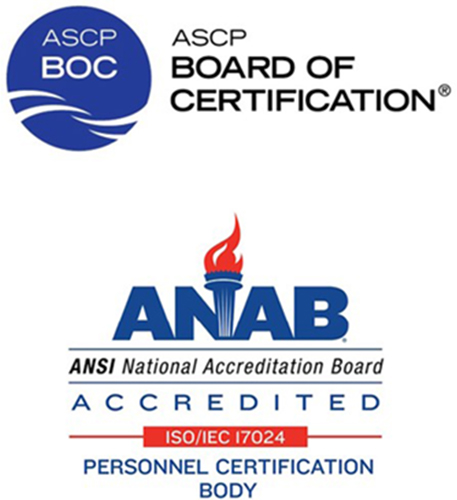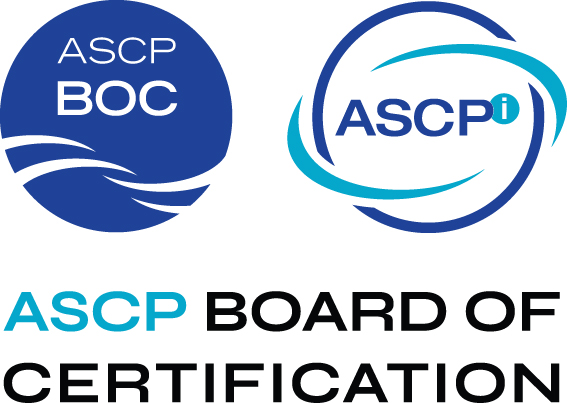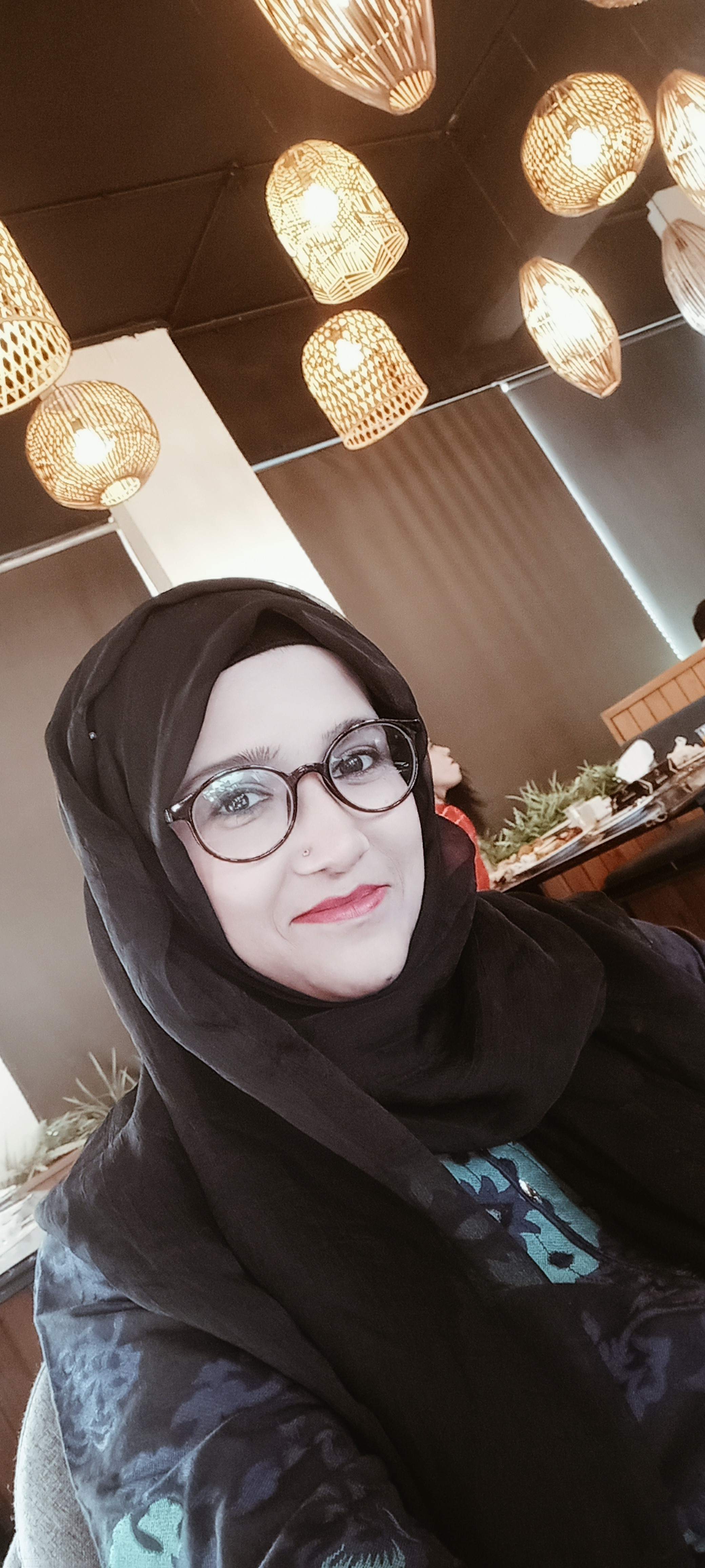Obtain certification and advance your career in molecular biology with our specialized credential.
Uses molecular diagnostic methods to detect and characterize acquired and inherited diseases, including malignant, metabolic, and infectious diseases. Uses advanced techniques, including sequencing and genomic analysis, with applications in personalized medicine.
Attaining an American Society for Clinical Pathology Board of Certification (ASCP BOC) credential requires a laboratory professional or other expert to meet specific education, training, and/or experience standards and to successfully pass an examination demonstrating knowledge and applied skills. The ASCP BOC offers ASCP and ASCPi credentials based on distinct eligibility requirements. All candidates must carefully compare credentialing options. Additional information is available about the similarities and differences between ASCP and ASCPi credentials.
Each credential has specific eligibility requirements, which are different for ASCP and ASCPi. It’s your responsibility to confirm that your education, training, and/or experience meet the criteria. Submit the correct documentation with your application. Once submitted, the category and route of application cannot be changed.
Check Your EligibilityAn applicant must be able to verify that they meet all eligibility requirements, including education, training, and/or experience. For complete information, see the Documentation section of the website.
Education does not need to be from the United States. Details are available by reviewing the webpage titled Acceptable Education, also available in the routes below.
To be eligible for this examination category, an applicant must satisfy the minimum requirements (for degrees, the stated degree or higher) of at least one of the following routes:
An applicant must be able to verify that they meet all eligibility requirements, including education, training, and/or experience. For complete information, see the Documentation section of the website.
Education needs to be equivalent to education from the United States. Details are available by reviewing the webpage titled Acceptable Education, also available in the routes below.
To be eligible for this examination category, an applicant must satisfy the minimum requirements (for degrees, the stated degree or higher) of at least one of the following routes:


*Acceptable Clinical Laboratory:
CMS CLIA certificate of registration, compliance, accreditation;
OR DoD CLIP certificate of registration, compliance, accreditation;
OR JCI accreditation;
OR Accreditation under ISO 15189.
^A molecular biology laboratory is defined as one capable of providing individuals with knowledge and practical experience in all aspects of molecular methods including, but not limited to, nucleic acid isolation, amplification, detection, sequencing, hybridization techniques, and data analysis.
Experience
To fulfill the experience requirement for the Scientist in Molecular Biology examination, you must have laboratory experience within the time frame required in at least one of the following areas:
*Acceptable Clinical Laboratory:
CMS CLIA certificate of registration, compliance, accreditation;
OR DoD CLIP certificate of registration, compliance, accreditation;
OR JCI accreditation;
OR Accreditation under ISO 15189.
^A molecular biology laboratory is defined as one capable of providing individuals with knowledge and practical experience in all aspects of molecular methods including, but not limited to, nucleic acid isolation, amplification, detection, sequencing, hybridization techniques, and data analysis.
Experience
To fulfill the experience requirement for the Scientist in Molecular Biology examination, you must have laboratory experience within the time frame required in at least one of the following areas:
Valid ASCPi technologist/scientist or specialist certification,
AND a baccalaureate degree from an accredited/approved* educational institution.
*Accredited/approved by a governing regulatory association or Ministry. Countries without a prevalent system of accreditation/approval must have programs/educational institutions approved by an International Advisory Board appointed by the ASCP Board of Certification, or eligibility will be determined by an acceptable transcript evaluation. The foreign degree must be equivalent to a U.S. degree.
Baccalaureate degree from an accredited/approved* educational institution,
AND successful completion of an accredited/approved* diagnostic molecular science program which includes an internship. The academic education or molecular science program must include courses in biology and chemistry and must be documented on this Training Documentation Form.
*Accredited/approved by a governing regulatory association or Ministry. Countries without a prevalent system of accreditation/approval must have programs/educational institutions approved by an International Advisory Board appointed by the ASCP Board of Certification, or eligibility will be determined by an acceptable transcript evaluation. The foreign degree must be equivalent to a U.S. degree.
Baccalaureate degree from an accredited/approved* educational institution,
AND successful completion of a 2-year Medical Laboratory Science program$. The training program must include blood banking (immunohematology), chemistry, hematology, and microbiology and must be documented on this Training Documentation Form.
*Accredited/approved by a governing regulatory association or Ministry. Countries without a prevalent system of accreditation/approval must have programs/educational institutions approved by an International Advisory Board appointed by the ASCP Board of Certification, or eligibility will be determined by an acceptable transcript evaluation. The foreign degree must be equivalent to a U.S. degree.
$Degrees/Diplomas in Medical Laboratory Science include Medical Laboratory Science, Medical Technology, Clinical Laboratory Science, and Biomedical Laboratory Science.
Baccalaureate degree from an accredited/approved* educational institution in biological science or chemistry, OR a baccalaureate degree from an accredited/approved* educational institution with a combination of 30 semester hours in biology and chemistry, which can be obtained within, or in addition to, the baccalaureate degree,
AND 1 year of acceptable clinical# experience in a molecular biology laboratory^ that must be documented on this Experience Documentation Form OR 1 year of acceptable veterinary, industry or research experience in a molecular biology laboratory^ that must be documented on this Experience Documentation Form.
*Accredited/approved by a governing regulatory association or Ministry. Countries without a prevalent system of accreditation/approval must have programs/educational institutions approved by an International Advisory Board appointed by the ASCP Board of Certification, or eligibility will be determined by an acceptable transcript evaluation. The foreign degree must be equivalent to a U.S. degree.
#Clinical laboratory accredited by JCI, CAP, under ISO 15189 or authorized by a governing regulatory association or Ministry. Countries without a prevalent system of accreditation must have laboratories approved by an International Advisory Board appointed by the ASCP Board of Certification.
^A molecular biology laboratory is defined as one capable of providing individuals with knowledge and practical experience in all aspects of molecular methods including, but not limited to, nucleic acid isolation, amplification, detection, sequencing, hybridization techniques, and data analysis.
Experience
To fulfill the experience requirement for the Scientist in Molecular Biology examination, you must have laboratory experience within the time frame required in at least one of the following areas:
Master’s degree from an accredited/approved* educational institution in molecular biology, chemistry, biology, immunology, microbiology, medical laboratory science$, or an appropriately related field,
AND 6 months of acceptable clinical# experience in a molecular biology laboratory^ that must be documented on this Experience Documentation Form OR 6 months of acceptable veterinary, industry, or research experience in a molecular biology laboratory^ that must be documented on this Experience Documentation Form.
*Accredited/approved by a governing regulatory association or Ministry. Countries without a prevalent system of accreditation/approval must have programs/educational institutions approved by an International Advisory Board appointed by the ASCP Board of Certification, or eligibility will be determined by an acceptable transcript evaluation. The foreign degree must be equivalent to a U.S. degree.
$Degrees/Diplomas in Medical Laboratory Science include Medical Laboratory Science, Medical Technology, Clinical Laboratory Science, and Biomedical Laboratory Science.
#Clinical laboratory accredited by JCI, CAP, under ISO 15189 or authorized by a governing regulatory association or Ministry. Countries without a prevalent system of accreditation must have laboratories approved by an International Advisory Board appointed by the ASCP Board of Certification.
^A molecular biology laboratory is defined as one capable of providing individuals with knowledge and practical experience in all aspects of molecular methods including, but not limited to, nucleic acid isolation, amplification, detection, sequencing, hybridization techniques, and data analysis.
Experience
To fulfill the experience requirement for the Scientist in Molecular Biology examination, you must have laboratory experience within the time frame required in at least one of the following areas:
Reduced pricing is available for those educated and residing in low-to-middle income countries.
You must upload the appropriate documentation form when you apply online, verifying that you meet the training and/or experience requirements for your category and route of application. You will also need to submit an acceptable transcript or transcript evaluation verifying that you meet the academic requirements. Gather your documents before submitting your application and application fee.
Once you have confirmed that you meet the requirements and have gathered your documents, submit your online application.
 |  |
In early 2026, the ASCP BOC will launch digital badging through Credly, a trusted provider that increases the visibility of ASCP BOC credential holders by securely showcasing and sharing professional credentials. Learn more about digital badges.
